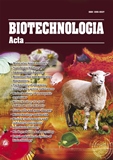ISSN 2410-7751 (Print)
ISSN 2410-776X (Online)

Biotechnologia Acta Т. 17, No. 2 , 2024
P. 27-28, Bibliography 8, Engl.
UDC:57.042:547.485+57.052:577.214:595.77+577.213.3
DOI: https://doi.org/10.15407/biotech17.02.027
ALPHA-KETOGLUTARATE INDUCES NUCLEAR RECEPTORS RATHER THAN NRF2 IN THE FRUIT FLY Drosophila melanogaster
O.I. Demianchuk, D.V. Gospodaryov
Vasyl Stefanyk Precarpathian National University, Ivano-Frankivsk, Ukraine
Aim. To test whether expression of Nrf2 targets in the fruit fly Drosophila melanogaster are activated by diet supplemented with alpha-ketoglutarate (AKG).
Methods. The Canton-S strain of D. melanogaster was used in the study. Female flies were reared in demographic cages (150 flies per group) on the medium containing 5% sucrose, 5% yeast, 1.2% agar, 0.18% nipagin. Experimental diet was supplemented with 10 mM disodium salt of AKG. The flies were reared during 21 days and after that were anesthetized with carbon dioxide and snap-frozen in liquid nitrogen for further biochemical studies. Expression of genes Ugt37A2, GstD2, and Cyp6a2, coding for a uridine diphosphate glycosyltransferase family 37 member A2, glutathione S-transferase D2, and cytochrome P450 6a2, respectively, respectively, was analyzed using semi-quantitative reverse transcription polymerase chain reaction followed by visualization of the products in agarose gel. The gene Tbp (TATA-box binding protein) was used as a reference gene.
Results. Flies fed AKG-supplemented diet during 21 days had 2.8-fold higher level of the Cyp6a2 expression than control flies. At the same time, AKG-supplemented food did not affect expression of Ugt37A2 and GstD2 genes.
Conclusions. Continuous consumption of AKG-supplemented food results in the increase in the levels of messenger ribonucleic acid of Cyp6a2 gene, a target of transcriptional factors Nrf2 and DHR96, but not Ugt37A2 and GstD2 genes. Since expression of the latter two genes was unaffected by AKG-supplemented diet, it indicates that AKG may influence other transcriptional regulators, such as nuclear receptors that have common targets with Nrf2.
Key words: Drosophila melanogaster, alpha-ketoglutarate, mRNA, Cyp6a2, Nrf2.
REFERENCES
1. Bayliak M.M., Lushchak V.I.. Pleiotropic effects of alpha-ketoglutarate as a potential anti-ageing
agent. Ageing Research Reviews. 2021, 66:101237. https://doi.org/10.1016/j.arr.2020.101237
2. Bayliak M.M., Lylyk M.P., Gospodaryov D.V., Kotsyubynsky V.O., Butenko N.V., Storey K.B.,
Lushchak V.I. Protective effects of alpha-ketoglutarate against aluminum toxicity in Drosophila
melanogaster. Comparative Biochemistry and Physiology Part C: Toxicology & Pharmacology.
2019, 217:41–53. https://doi.org/10.1016/j.cbpc.2018.11.020
3. Lylyk M.P., Bayliak M.M., Shmihel H.V., Storey J. ., Storey K.B., Lushchak V.I. Effects of alphaketoglutarate
on lifespan and functional aging of Drosophila melanogaster flies. UkrBiochemJ.
2018, 90(6):49–61. https://doi.org/10.15407/ubj90.06.049
4. Gospodaryov D.V., Strilbytska O.M., Semaniuk U.V., Perkhulyn N.V., Rovenko B.M., Yurkevych I.S.,
Barata A.G., Dick T.P., Lushchak O.V., Jacobs H.T. Alternative NADH dehydrogenase extends
lifespan and increases resistance to xenobiotics in Drosophila. Biogerontology. 2020, 21(2):155–
171. https://doi.org/10.1007/s10522-019-09849-8
5. Misra J.R., Horner M.A., Lam G., Thummel C.S. Transcriptional regulation of xenobiotic detoxification
in Drosophila. Genes Dev. 2011, 25(17):1796–1806. https://doi.org/10.1101/gad.17280911
6. King-Jones K., Horner M.A., Lam G., Thummel C.S. The DHR96 nuclear receptor regulates
xenobiotic responses in Drosophila. Cell Metabolism. 2006, 4(1):37–48. https://doi.org/10.1016/j.
cmet.2006.06.006
7. Afschar S., Toivonen J.M., Hoffmann J.M., Tain L.S., Wieser D., Finlayson A.J., Driege Y., Alic N.,
Emran S., Stinn J., Froehlich J., Piper M.D., Partridge L. Nuclear hormone receptor DHR96
mediates the resistance to xenobiotics but not the increased lifespan of insulin-mutant Drosophila.
Proc Natl Acad Sci USA. 2016, 113(5):1321–1326. https://doi.org/10.1073/pnas.1515137113
8. Sieber M.H., Thummel C.S. The DHR96 Nuclear Receptor Controls Triacylglycerol Homeostasis in
Drosophila. Cell Metabolism. 2009, 10(6):481–490. https://doi.org/10.1016/j.cmet.2009.10.010
© Palladin Institute of Biochemistry of National Academy of Sciences of Ukraine, 2024

